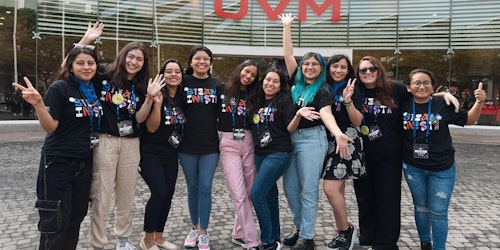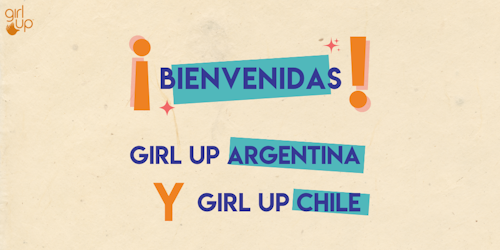Tiempo estimado de lectura: 3 minutos
¡Wow! Estos últimos meses estuvieron repletos de activaciones por los derechos de las mujeres en toda la red de Girl Up. No queríamos dejar de compartirles nuestra experiencia en las oficinas de Kotex Argentina en el mes de marzo dialogando sobre cómo las jóvenes hoy #SentimosElProgreso hacia una sociedad más equitativa.
La actividad tuvo un enfoque de gran intimidad y se llevó a cabo con un cine debate. Tras una breve introducción del avance en el rol de la mujer, Kotex presentó un video perteneciente a la campaña #SentimosElProgreso. Este video expone los prejuicios y conflictos que las mujeres seguimos teniendo que soportar, a pesar de todo el progreso que logramos tras años de luchar. Nos dice que luchar por mejores condiciones no es cómodo, pero que aún así logramos un montón. El ambiente que se generó fue de entendimiento y escucha, ya que cada una pudo compartir la incomodidad que siente en su propia vida.

Un resultado muy impresionante del estudio presentado por Kotex es que el 63% de las mujeres argentinas sienten que la velocidad del progreso está estancada o avanza lentamente. En el mundo en el que vivimos estamos acostumbrados a que todo el progreso, desde los avances científicos hasta las disputas políticas, suceden muy rápido. En relación a la evolución constante de la sociedad, el avance del rol de la mujer parece haberse quedado estancado, y muchas veces no recibe la importancia que debe para mejorar.
Otro resultado fue que la mitad de las entrevistadas considera que el mundo siempre ha sido un lugar menos cómodo para las niñas y las mujeres. Esto se aplica desde la comodidad menstrual hasta la seguridad. Vivir en un mundo donde no nos sentimos cómodas es un tema muy serio que no debe ser normalizado. Las mujeres no deberíamos acostumbrarnos a diversas situaciones y contentarnos con lo mínimo, solo porque así se espera. Es tiempo de que el ritmo de cambio aumente, de que nos animemos a expresar nuestras voces sin miedo a lo que pueda llegar a decir la sociedad, porque tiene el potencial de inspirar a otros a hacer lo mismo y despertar nuevos pensamientos.
Luego de discutir estos temas, decidimos concretar todas estas ideas en un fanzine. Esta es una especie de revista colectiva y artística enfocada en un tema en específico. ecidimos diseñarla como un collage y dividirla en tres secciones.



La primera se basó en lo que logramos hasta ahora, reflejando figuras y símbolos de progreso; Greta Thumberg, el Congreso y Ni Una Menos entre ellos. La segunda sección tuvo como objetivo mostrar cómo nos sentimos al respecto. Manifestamos nuestros sentimientos comparando nuestro enojo e incomodidad y nuestra indignación frente a la situación. Mientras que una hoja repleta mostraba los prejuicios que sufrimos en áreas como el deporte y las matemáticas. Lla hoja de al lado no tenía nada escrito. Esto tuvo el fin de maximizar el efecto y contrastar estos sentimientos. La tercera sección se enfocó en lo que nos falta conseguir, representando figuras de lucha como Malala Yousafzai, el congreso y Ni Una Menos.
Siento que el fanzine fue una forma increíble de manifestar los sentimientos que el debate nos produjo y terminar de concretar las ideas. Pudimos terminar de ponernos de acuerdo y llegar a la conclusión de la importancia de alzar nuestras voces y luchar por nuestro rol en la sociedad.
Descargá el fanzine completo aquí
Collective Fanzine: How Does Progress Feel Like?
Estimated reading time: 3 minutes
Wow! These last few months have been full of activations for women’s rights throughout the Girl Up network. We did not want to stop sharing our experience in the Kotex Argentina offices in the March where we discussed how #ProgressFeelsLike for us.
The activity was highly intimate and was carried out with a film debate. After a brief introduction to the progress in the role of women, Kotex presented a video belonging to the #ProgressFeelsLike campaign. This video exposes the prejudices and conflicts that women continue to have to endure despite all the progress we have made after years of fighting. It tells us that fighting for better conditions is uncomfortable, but we still achieve a lot. The environment was one of understanding and listening since each could share their discomfort in their own life.

A very impressive result of the study presented by Kotex is that 63% of Argentine women feel that the speed of progress is stagnant or moving slowly. In our world, we are accustomed to all progress, from scientific advances to political disputes, happening very quickly. In relation to the constant evolution of society, the advancement of women’s roles seems to have remained stagnant, and many times, it does not receive the importance it should to improve.
One of the key findings of the study was that half of those interviewed believe that the world has always been a less comfortable place for girls and women. This is a stark reality that we must not accept as the norm. We should not settle for the minimum just because it’s expected. It’s time for the pace of change to accelerate, for us to be emboldened to express our voices without fear of societal judgment. This is not just about us, but about inspiring others and sparking new thoughts.
After discussing these topics, we translated all these ideas into a fanzine. This is like a collective and artistic magazine focused on a specific topic. We decided to design it as a collage and divide it into three sections.



The first was based on what we have achieved so far, reflecting figures and symbols of progress; Greta Thumberg, Congress, and Ni Una Menos. The second section aimed to show how we feel about it. We express our feelings by comparing our anger, discomfort, and indignation regarding the situation. While a full sheet showed the prejudices, we suffer in areas such as sports and mathematics. The next page had nothing written on it. This was intended to maximize the effect and contrast these feelings. The third section focused on what we need to achieve, representing figures of struggle such as Malala Yousafzai, the Congress, and Ni Una Menos.
I feel that the fanzine was an incredible way to express the feelings that the debate produced in us and to finalize the ideas. We were able to finish agreeing and come to the conclusion of the importance of raising our voices and fighting for our role in society.
Download the full fanzine here.








